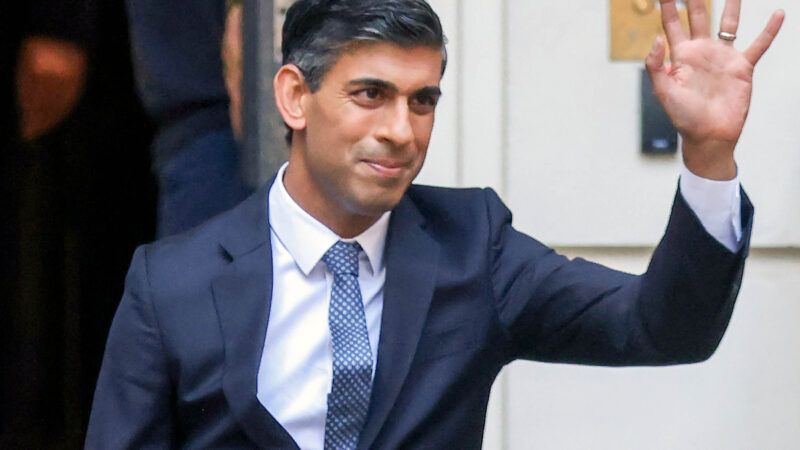New Prime Minister Rishi Sunak Will Probably Disappoint Fans of Free Markets
After 50 days, Liz Truss is out as the U.K. prime minister and Rishi Sunak is in.

Just 50 days after losing to Liz Truss in a Conservative leadership election, Rishi Sunak finds himself the prime minister of the United Kingdom anyway.
The Conservative Party originally rejected Sunak because of his tax policies as chancellor of the exchequer and his perceived role in bringing down former Prime Minister Boris Johnson. But after the financial turmoil that followed Truss's tax-cutting "mini-budget," Conservative members of Parliament (M.P.s) forced her from office, creating a fresh route for Sunak to bounce into Downing Street.
In the hasty contest that followed, most conservative media had swung behind Sunak given his perceived prescient warnings about the financial effects of a Truss government. Johnson then decided not to stand and Penny Mordaunt, the only other declared candidate, stepped aside after struggling to pass the nomination threshold. Sunak was thus coronated unopposed on Monday in the most unlikely comeback.
Sunak had been appointed by Johnson as chancellor in February 2020 as a more pliable finance minister for Johnson and Dominic Cummings' Downing Street. During the early stages of the pandemic, he became the most popular Chancellor for 15 years as he showered money to keep workers attached to shuttered firms through a huge "furlough" program.
His relationship with the grassroots soured, however, over the next two years. He first set out plans to raise the corporation tax rate from 19 percent to 25 percent to finance past pandemic spending. He then broke a manifesto pledge not to raise personal taxes by increasing Britain's employees' and employers' social security taxes by 1.25 percent each. Alongside the freezing of income tax thresholds, the resultant tax burden under him was set to increase to its highest level for 70 years.
Sunak's own resignation from the Cabinet then helped precipitate Johnson's ejection. The former chancellor had a polished video for his candidacy ready to go as soon as Boris departed. Tory members smelt a planned knifing, and as the leadership campaign developed, his unpopular tax policy became the central cleavage with Truss.
She pledged to abandon both Sunak's corporation tax rise and reverse the social security tax increases. Without offsetting spending cuts, Sunak argued this risked a surge in the U.K. government's borrowing costs, feeding through into higher mortgage rates. Truss won the debate but has since lost the argument.
Her "mini-budget" delivered on her tax promises, yet went much further than expected. She and her chancellor spooked markets by also cutting two income tax rates and several smaller taxes and subsidizing a freeze in household unit energy prices for two whole years. Each had microeconomic justifications, but markets went haywire at the scale of additional borrowing and the uncertainty of its passthrough to interest rates. It didn't help that Truss's government refused to allow the Office for Budget Responsibility to set out estimates of how all this would affect deficits.
The pound became very volatile, and U.K. borrowing costs surged, as Sunak predicted, particularly after Truss's Chancellor Kwasi Kwarteng promised that more tax cuts would come. Some pension funds exposed to bond yield risk almost went bust, requiring an emergency Bank of England intervention. Mortgage rates rose sharply. The Conservatives' polling numbers plunged.
Truss u-turned on several tax pledges to restore market confidence, as Tory M.P.s made clear they would not tolerate any major offsetting spending cuts. Bond yields became hooked to British political developments, falling each time a fiscally conservative signal was given. Truss ultimately backed down entirely, firing her chancellor and allowing his replacement, Jeremy Hunt, to abandon almost all tax cuts except the social security reversal, while only committing to the universal energy policy until April. The Party has reembraced deficit reduction.
And so, Sunak finds himself prime minister, having made no policy pledges at all in this more recent, short campaign. The new prime minister is a committed fiscal conservative and not afraid to raise taxes to achieve it. He regularly pays rhetorical homage to free markets, but in the leadership campaign with Truss advocated for a producer-led trade policy and for tightening the U.K.'s already stringent land use planning laws. Those hoping he will maintain Truss's unrealized plans for deregulatory, non-tax, supply-side policies are likely to be disappointed.
Will the change of leader pay off politically? Tories will expect a boost, but Sunak is the sort of Conservative that columnists who would never vote Conservative say they respect. Will a super-wealthy jet-setter go down smoothly during a cost-of-living crisis that he, as chancellor, contributed to? The jury is out.


Show Comments (51)